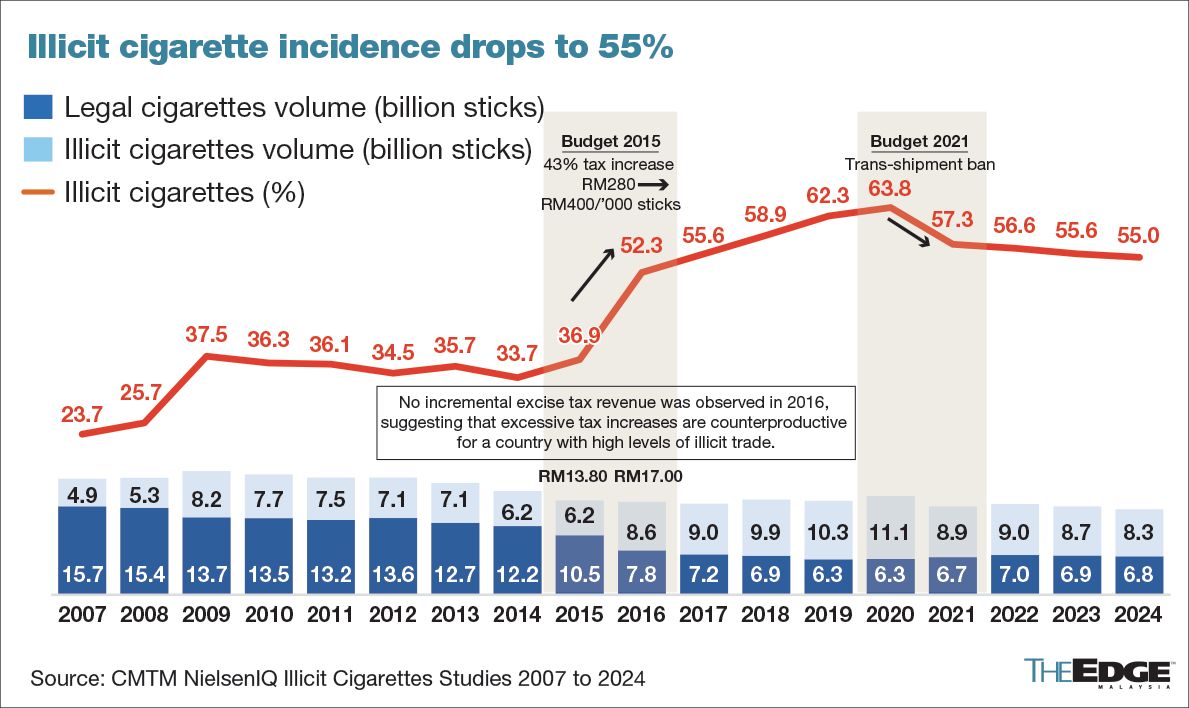
JT International Bhd (JTI Malaysia) managing director Juliana Mohd Yahaya says the company will continue to advocate for the government to transition from paper-based tax stamps to digital tax codes for cigarettes, aligning with the government’s digitalisation drive. (Photo by Zahid Izzani/The Edge)
KUALA LUMPUR (Feb 26): The prevalence of illicit cigarettes in Malaysia fell for a fourth consecutive year to 55% in 2024, from 55.6% in 2023, which JT International Bhd (JTI Malaysia) managing director Juliana Mohd Yahaya attributed to law enforcement efforts in curbing illegal tobacco smuggling, and a ban on trans-shipment of tobacco products.
This marked the lowest level since its peak of 63.8% in 2020.
“We expect the incidence of illicit cigarettes to continue to decline this year. What has also contributed to the reduction in illicit cigarette incidence is the ongoing tobacco tax moratorium by the Ministry of Finance. But we know that at some point, [the moratorium] will end, so if the government were to impose an excise increase on tobacco products, we hope that it would be a moderate and predictable one,” she said at a news conference to reveal findings of the annual Illicit Cigarettes Study (ICS) for 2024 here on Wednesday.
Meanwhile, the latest ICS — commissioned by the Confederation of Malaysian Tobacco Manufacturers (CMTM) and conducted by Nielsen Malaysia — revealed a surge in cigarettes bearing fake tax stamps, constituting 13.8% of the illicit cigarette market, up from 8.7% in 2023 and 7.9% in 2022.
Juliana said while illicit whites continued to make up the largest share of the illicit cigarette trade (34.3%), its share has been decreasing. “But the number of illicit cigarettes carrying fake tax stamps and getting passed as legal cigarettes has been growing at an alarming rate.”
“As such, JTI Malaysia continues to advocate for the government to transition from paper-based tax stamps to digital tax codes, aligning with the government’s digitalisation drive."
Until then, she expects the share of the illicit cigarettes carrying fake tax stamps to continue to grow.
Still, despite the decline in the incidence of illicit cigarettes in the country, Juliana pointed to the continuous decline in the sales volume of legal cigarettes, as smokers increasingly pivot towards smoke-free alternatives, such as heated tobacco products (HTPs) and vaping products. Total legal cigarette sales volume stood at 6.8 billion sticks in 2024, down from 6.9 billion sticks in 2023 and seven billion sticks in 2022.
“The vaping industry is the biggest beneficiary of the decline in the incidence of illicit cigarettes. [For instance,] 10 years ago, legal cigarettes accounted for 66.3% of the market, and the remaining 33.7% was illegal cigarettes. Now, legal cigarettes make up 23.8% of the market, while 29.9% are illicit cigarettes. Another 25.3% constitutes e-cigarettes or vapes and HTPs. The remaining 20.4% comprises users who smoke both cigarettes and vapes or HTPs,” she said, adding that the legal industry volume is expected to decline or remain flat going forward, as more consumers shift to vaping products.
E-liquids containing nicotine have been exempted from the Poisons Act 1952 since April 1, 2023, but regulations under the Control of Smoking Products for Public Health Act 2024 will be implemented in stages, starting with the mandatory registration of vaping products by April 1, 2025.
While the government’s move towards regulatory parity for vaping products is a step in the right direction, Juliana said enforcement is key.
“As an industry, our concern is that when you have all these regulations for vaping products and cigarettes, there will also be more illicit products coming in as well.
“If you look at the size of the vaping industry today, it is even bigger than the illicit market. This is something that we will need to look at, and we urge the government to step up in terms of their enforcement efforts. Vapes appeal a lot to the youth, because of their affordability, and they are easily available. And basically, there's not that much regulation on vaping until now,” she added.
On the impending ban on displaying tobacco and vape products come April, Juliana said: “It will not change the landscape that much, the reason being illicit products are already being sold under the table. They are not being displayed [openly].”
- Global funds hit pause on Indonesia after Prabowo policy changes
- Embattled billionaire Ong Beng Seng to step down from Hotel Properties
- Trump warns tariffs coming for electronics after reprieve
- Jentayu signs 40-year power purchase agreement for RM2.8b 162MW Sabah hydropower project
- Singapore eases monetary policy as expected, sees weaker growth in 2025
- Cambodia deports unknown number of Taiwanese to China on fraud charges, says Taiwan
- Goldman Sachs warns oil faces ‘large surpluses’ through 2026
- China’s stock rescue in full swing as ETF inflows hit record
- Knight Frank survey indicates optimism for Malaysia’s commercial sector this year
- The State of the Nation: US’ trade deficit-based ‘reciprocal’ tariffs set to test fiscal and monetary policy space

